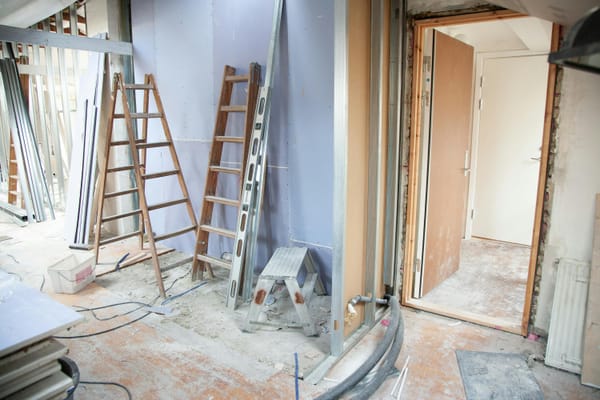What Does a Finish Carpenter Do? (And When Should You Hire One?)

Finish carpentry is one of the most important yet underappreciated aspects of construction and remodeling. While rough carpenters frame the skeleton of a structure, finish carpenters add the details that bring a space to life. From crown molding and baseboards to staircases and cabinetry, finish carpenters handle the final touches that define a room’s character.
If you’re a homeowner or small business owner considering an interior upgrade or custom woodwork project, understanding the role of a finish carpenter—and when to bring one on board—can save you time, money, and headaches.
This article dives into what finish carpenters do, the types of projects they handle, and why their specialized skills are often essential for polished, professional results.
What Is a Finish Carpenter?
A finish carpenter is a skilled tradesperson who specializes in the final phase of carpentry work—the installation of decorative and functional wood elements that complete the look of a building's interior.
Their work requires a high level of precision, attention to detail, and craftsmanship. Unlike rough carpenters who focus on framing and structural tasks, finish carpenters handle the visual and tactile components of a space.
Common finish carpentry tasks include:
- Installing crown molding, baseboards, and chair rails
- Custom-built shelving, mantels, and cabinetry
- Window and door casings
- Wainscoting and wall paneling
- Stair railings, banisters, and balusters
- Interior doors and hardware
Skills and Tools of the Trade
Finish carpentry is detail-oriented work. Finish carpenters must be adept in:
- Measuring and layout: Accurate measurements are critical to avoid gaps, uneven joints, or wasted materials.
- Joinery: Understanding various wood-joining methods like mitering, coping, dovetailing, and mortise-and-tenon.
- Precision cutting: Using tools such as miter saws, routers, chisels, and sanders.
- Wood finishing: Staining, painting, and sealing wood to match existing finishes or create new design statements.
Specialized tools may include:
- Coping saws
- Precision levels and laser levels
- Pin nailers and brad nailers
- Router tables and jointers
A finish carpenter also needs a good eye for aesthetics and must be able to work with various materials like hardwood, MDF, PVC, or veneer.
Projects That Require a Finish Carpenter
Finish carpenters are often called in for high-visibility upgrades or details that demand a refined touch. Here are a few examples:
1. Custom Trim Installation
Projects involving crown molding, baseboards, or chair rails require exact angle cuts and seamless joints. These elements can dramatically elevate a room but only if installed with precision.
2. Built-In Cabinetry and Shelving
Unlike pre-fab furniture, built-ins require tailored dimensions, thoughtful design, and integration with existing architectural features. Finish carpenters ensure a tight, symmetrical fit.
3. Interior Door and Hardware Installation
Misaligned doors and uneven hardware can instantly downgrade the look of a room. Finish carpenters guarantee smooth operation and visual symmetry.
4. Staircase Finishing
Handrails, balusters, and newel posts need to meet safety codes and still look beautiful. This is where the artistic eye of a finish carpenter shines.
5. Wainscoting and Decorative Wall Panels
Adding wainscoting or wall frames is a popular upgrade for upscale homes and offices. Each piece must align perfectly, especially around outlets or architectural quirks.
Benefits of Hiring a Finish Carpenter
1. Quality Craftsmanship
Finish carpenters bring a level of detail that’s difficult to replicate with DIY methods or general labor. Their work enhances both function and form.
2. Efficiency and Accuracy
While it might take a homeowner days to install trim (with mistakes), a finish carpenter can complete the same task with higher accuracy in half the time.
3. Design Insight
Experienced finish carpenters offer input on profiles, materials, and layout decisions that harmonize with your home or commercial space.
4. Long-Term Value
Well-executed finish carpentry not only improves aesthetics but also adds to a property’s resale value and durability.
DIY vs. Hiring a Pro
Some finish carpentry tasks, like installing simple baseboards, are manageable for experienced DIYers. However, more intricate projects—like crown molding or custom millwork—are better left to professionals.
DIY is suitable for:
- Flat stock trim in square rooms
- Prefinished baseboard replacement
- Painting or sealing existing trim
Hire a pro for:
- Crown molding in rooms with many corners or vaulted ceilings
- Matching trim in historical homes
- Custom cabinetry and built-ins
- Multi-room or large-scale projects
When to Bring in a Finish Carpenter
Finish carpenters are typically scheduled toward the end of a remodeling or construction project, after:
- Walls are finished and painted
- Flooring is installed
- Electrical and plumbing systems are finalized
If you’re remodeling an existing space or refreshing a room’s interior, you can consult a finish carpenter during the planning phase to estimate costs, select materials, and schedule work efficiently.
Choosing the Right Finish Carpenter
When hiring a finish carpenter, look for:
- Portfolio examples of similar projects
- Client references or online reviews
- Licensing and insurance appropriate for your region
- Experience with your project type, such as commercial spaces or historic homes
Always get a detailed estimate and timeline. Clear communication upfront can prevent misunderstandings later.
Final Thoughts
Finish carpentry may be the last phase of a construction or remodeling project, but it leaves one of the most lasting impressions. From the subtle curve of a crown molding to the functionality of custom shelving, the work of a finish carpenter shapes how a space looks, feels, and functions.
For homeowners looking to boost property value or elevate everyday living, and for small business owners aiming to impress clients and customers, hiring a skilled finish carpenter is a smart investment.
Because when it comes to craftsmanship, the details aren’t just important—they’re everything.



